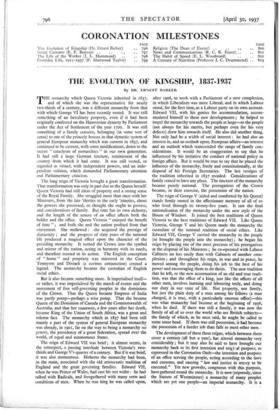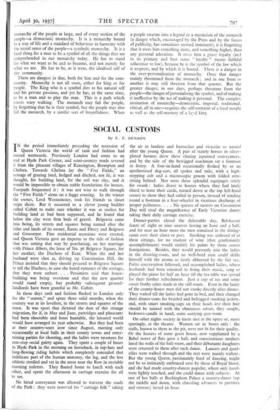THE EVOLUTION OF KINGSHIP, 1837-1937
CORONATION MILESTONES
By DR. ERNEST BARKER
THE monarchy which Queen Victoria inherited in 1837, and of which she was the representative for nearly two-thirds of a century, was a different monarchy from that with which George VI has been recently vested. It was still something of an hereditary property, even if it had been originally conferred on the Hanoverian dynasty by Parliament under the Act of Settlement of the year 17o0. It was still something of a family concern, belonging (in some sort of sense) to one of the princely houses in that dynastic system of general European monarchy which was current in 1837, and continued to be current, with some modifications, down to the recent " cataclysm of monarchies " in our own generation. It had still a large German tincture, reminiscent of the country from which it had come. It was still vested, or regarded as vested, with independent powers, and an inde- pendent volition, which demanded Parliamentary attention and Parliamentary criticism.
The long reign of Victoria brought a great transformation. That transformation was only in part due to the Queen herself. Queen Victoria had still ideas of property and a strong sense of the Royal Family. She struggled more than once with her Ministers, from the late 'thirties to the early 'nineties, about the powers she possessed, or. thought she ought to possess, and considerations of family. But time has its own alchemy, and the length of the tenure of an office affects both the holder and the office. Queen Victoria " enjoyed the benefit of time " ; and both she and the nation profited from that enjoyment. She mellowed : she acquired the prestige of diutumity ; and the progress of sixty years of the national life produced a magical effect upon the character of the presiding monarchy. It turned the Crown into the symbol and mirror of the nation, acting in harmony with its needs, and therefore trusted in its action. The English conception of " home " and propriety was mirrored in the Court. Tennyson and Disraeli (a curious conjunction) created a legend. The monarchy became the custodian of English social ethics.
But it also became something more. It imperialised itself— or rather, it was imperialised by the march of events and the movement of free self-governing peoples in the dominions of the Crown. That the Queen became Empress of India was partly pomp—perhaps a wise pomp. That she became Queen of the Dominion of Canada and the Commonwealth of Australia, and that her successor, a few years after her death, became King of the Union of South Africa, was a great and solemn fact. The monarchy which in 1837 had been still mainly a part of the system of general European monarchy was already, in igoi, far on the way to being a monarchy sui generis, the presidency of a great federation, spread over the world, of equal and autonomous States.
The reign of Edward VII was brief; it almost seems, in the retrospect, a passing interlude between Victoria's two- thirds and George V's quarter of a century. But if it was brief; it was also momentous. Hitherto the monarchy had been, in the main, associated with the old aristocratic tradition of England and the great governing families. Edward WI, when he was Prince of Wales, had cast his net wider : he had talked with Radicals, and foregathered with many sorts and conditions of men. When he was king he was called upon, after 1906, to work with a Parliament of a new complexion, in which Liberalism was more Liberal, and in which Labour stood, for the first time, as a Labour party on its own account. Edward VII, with his genius for accommodation, accom- modated himself to these new developments ; he helped to impel the monarchy towards the people at large—or the people (not always for his merits, but perhaps even for his very defects) drew him towards itself. He also did another thing. Not only had he a width of social interest : he had also an interest in, and an outlook upon, European affairs—an interest and an outlook which transcended the range of family con- siderations. It would be an exaggeration to say that he influenced by his initiative the conduct of national policy in foreign affairs. But it would be true to say that he placed the influence of the monarchy, freely and constitutionally, at the disposal of his Foreign Secretaries. The last vestiges of the tradition inherited in 1837 receded. Considerations of family ceased to have any place. The tincture of the monarchy became purely national. The prerogatives of the Crown became, in their exercise, the possession of the nation.
The reign of George V (aided and comforted by his Queen) stands firmly rooted in the affectionate memory of all of us who lived through its twenty-five years. It saw the final nationalisation of the monarchy under the new style of the House of Windsor. It joined the best traditions of Queen Victoria to the best traditions of Edward VII. Like Queen Victoria, George V and his Queen made the monarchy the custodian of the national tradition of social ethics. Like Edward VII, George V carried the monarchy to the people (or brought the people into the monarchy) ; he began his reign by placing one of the most precious of his prerogatives at the disposal of his Ministers ; he co-operated with Labour Cabinets no less easily than with Cabinets of another com- plexion ; and throughout his reign, in war and in peace, he moved among the people, doing his job to the best of his power and encouraging them to do theirs. The new tradition that he left, or the new accentuation of an old and true tradi- tion, was that the office of a king, just like the offices of all other men, involves learning and labouring truly, and doing our duty in our state of life. Not property, nor family-, but just the plain duty of a man among his fellows (a man charged, it is true, with a particularly onerous office)—this was what monarchy had become at the beginning of 1936, when he died. If there was still a family, it was now the family of all of us over the world who are British subjects— the family of which, as he once said, he might be called in some sense head. If there was still possession, it had become the possession of a harder job than falls to most other men.
The development of these three reigns, which between them cover a century (all but a year), has altered monarchy very considerably ; but it may also be said to have brought our monarchy back to its first intention and origi:al purpose, as expressed in the CorOnation Oath—the intention and purpose of an office serving the people, acting according to the laws and customs, and causing " law and justice in mercy to be executed." Yet new growths, congruous with this purpose, have gathered round the monarchy. It is now (expressly, since the Statute of Westminster) a monarchy of many peoples which are yet one people—an imperial monarchy. It is a monarchy of the people at large, and of every section of the people—a democratic monarchy. It is a monarchy bound to a way of life and a standard of behaviour in harmony with the moral sense of the people—a symbolic monarchy. It is a hard thing for a man to be a symbol of all the things that are comprehended in our monarchy today. He has to stand for what we want to be and to become, and not merely for what we are. He has to be, as it were, the idealised self of the community.
There are dangers in that, both for him and for the com- munity. Monarchy is not all roses, either for king or for people. The King who is a symbol dies to his natural self and his private passions, and yet he has, at the same time, to be a man and to play the man. This is a path which craves wary walking. The monarch may fail the people, by forgetting that he is their symbol, but the people may also fail the monarch, by a similar sort of forgetfulness. When a people swarms into a legend or a mysticism of the monarch (a danger which, encouraged by the Press and by the forces of publicity, has sometimes seemed imminent), it is forgetting that it owes him something more, and something higher, than any personal adoration. It owes him a grave loyalty (aid in its primary and best sense " loyalty " means faithful adherence to law), because he is the symbol of the law which it respects, and by which it is bound. There is a danger in the over-personalisation of monarchy. Once that danger mainly threatened from the monarch ; and in one form or another it may still threaten from that quarter. But the greater danger, in our days, perhaps threatens from the people—the danger of personalising the symbol, and of making it ineffective by the act of making it personal. The complex institution of monarchy—democratic, imperial, traditional, ethical, all in one—requires the self-restraint of a loyal people as well as the self-mastery of a leal king.



































































 Previous page
Previous page